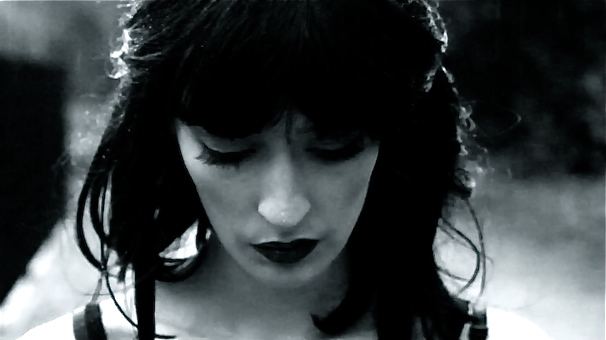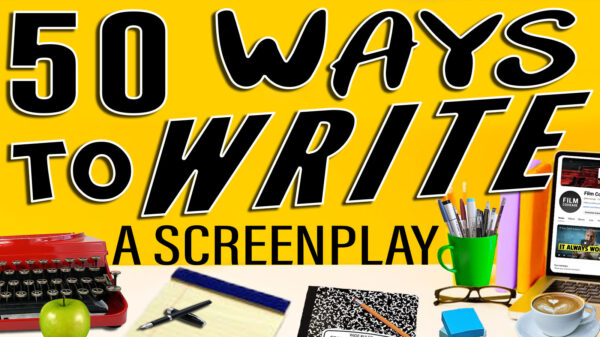
As winter dark sets in, and the deafening roar of holiday cheer brings reasonable justification to shutter down and watch films, I return – by way of a very lowbrow infatuation with Monica Vitti – to the work of that bicycle-less master, Antonioni. Watching the seamless rhythm of his long cuts and musical edit beats, I found myself ruminating (with the fatality that the year’s end always seems to bring) on all things seasonal: the drawing and quartering of the year and the kind of society freeze branded for posterity in 2011.
As Scarvada’s camera pans slowly, it is Vitti’s sharp laugh that punctures my maudlin reverie, and makes me consider not only how film has changed – but all related mediums, as well as the audience it caters to. Antonioni’s ‘L’avventura’ was scorned at its Cannes premiere in 1960 (most of the audience left howling – but not before beseeching “cut! cut!”) yet also garnered an unthinkable credit: a Jury prize created solely in its honour (no doubt to balance the drone of naysayers), in part – for its audacity in seeking the creation of a “new film language.” It is the nature of this “film language” that makes me think that Antonioni’s trifecta of ‘slow’ masterpieces was not just an act of aesthetic sedition. In stark contrast to the almost lethargic
undulation of his films stand the desperately fast cuts used today – and these cuts are visibly etched into culture everywhere, not just in the medium of film. Considering society’s “evolution” toward mass communication, the constant interchange of information and the subsequent menial commentary this interchange induces – it is exciting to imagine that Antonioni had a dream of things to come, and thereby created the ultimate cinematic antithesis. Or at least, a veritable record of an original rhythm: the temporal workings of the human brain and body before our synapses started changing.

Monica Vitti, L’avventura
For better or worse, the adoption of mass informal communication, the narcissistic spillage of personal details into the ether and the sheer superabundance of available information (and outlets by which information is made available) must surely be one of the most defining factors of this century. As the human brain attunes itself to being sated in 140 characters or less, the more Antonioni’s so called “double composition”1 – a cinema of the body and a cinema of the brain – feels like a phenol injection to the senses. As does reading Coleridge. It is small wonder then that even the schoolmaster’s staple, Chaucer and his “Canterbury Tales,” is being phased out of education. Could MTV with its frenzied schizophrenic cuts and three minute rules have been the harbinger, the mental and emotional precursor to the Twitters and Facebooks of our age? The human brain is evolving to a staccato beat, massive amounts of shallow information distributed instantaneously and without analysis.
First of all, how did we get here? Fifty years on from Antonioni’s ‘L’Avventura’, into a world of incessant “sound and fury” that really, unless you have a vital interest in what Ashton Kutcher thinks of – well anything – truly “signifies nothing.” Snippets of information are available on a multitude of platforms that didn’t exist five years ago and have become socially integrated to a level by which it is hard to imagine contemporary society without them. The vision of MTV reigns supreme. Other than watch horses (in a Desmond Morris – not Peter Shaffer “Equus” – way), there are few activities likely to sustain my sporadically myopic concentration for prolonged periods of time. An exception: music videos. A fast-moving ecstasy of sound and vision, they are the exception that decisively proves the rule (I am guilty: even watching ‘Dexter’ I fight the impulse to check my Blackberry every five minutes). It occurs that MTV’s cataclysmic effect is its influence on not only filmmaking but intellectual culture in general: accessible pop-art saturated with emotional information in an undemanding frame. Minus the pop art component, the same could be said of a “friend’s” status update. Amphetamine induced editing, acid infused cinematography, the MTV generation’s triumph: fascination and satiation in short bursts, stories complete in three minutes, information saturated and sold before it can be fully absorbed or understood – though, maybe there’s nothing to understand? The shortening of attention spans, the acceleration of the mind’s ability to accept – if not contextualize – massive amounts of information in small jagged doses. Facebook, Twitter, constant commentary, short meaningless information spat out at the speed of an MK19 in full release. Yet MTV can hardly be blamed for the intellectual perils of our age. Most people pay “considerable attention to forms of popular music, but are not prepared to feel or even experience the music of Haydn, Bach, or Mozart… their hearts are closed, or partially closed, to the canon of Western music.” The same applies to literature, theatre, cinema: There is indeed “something missing in the aesthetic experience of our young."2 In the time it takes to make a cup of tea, a world of opinions and passing observations have been disseminated throughout cyberspace. A constant stream of small ideas. And as the deities and monarchs of our age, what – or whose – opinions seem to count the most? Where the western world at large is concerned, and especially the astute denizens of Hollywood, that would be the expensively-appointed reserve of celebrities. As wryly noted by Woody Allen, "You can learn a lot about a society by who it chooses to celebrate;" thus it is hardly mollifying that we choose to celebrate not journalists, poets or teachers, but actors, rockstars, models – those who make a career of self-promotion and the manipulation of images and information. Hardly edifying, but such is the age. And in a way, it has always been thus: one of my favourite things about Jean-Jacques Rousseau (the giant who wrote ‘The Social Contract’ which precipitated the French Revolution) – other than that he moonlighted as a back alley ‘flasher’ (!) – was his discovery that in order to be anything in the world, one must secure the services of a good publicist. Rousseau put his formidable mind to significant work, and the confluence of his genius, loud PR and proximity to the Royal Court have proved a lasting, inspiring legacy. Though what of the PR world today? The vanity it is collectively paid to serve through a plethora of avenues…So many ways to celebrate shallow information. Boredom becomes boundless.
The advent of social networking, the speed of global communication (or to use an antiquated expression: the ‘information superhighway’) have admittedly yielded astonishing events – the role of Facebook in the development of the Arab Spring perhaps foremost among them…but an event occurred recently which rang out like a portend of things to come. Before it was washed over with millions of new posts and jots of meaningless information (the highway appears flooded), something for a second exposed the double nature of the moment our culture finds itself in now – at once exculpating – and condemning – our instant access/reliance on ‘mass’ communication/information. In this duplicitous moment, many questions could be tendered: the ramifications of the “superhighway’s” effect on society, learning, changes in the development of neural pathways – but ultimately, the question that intrigued me most (as someone who purports/hopes to be a filmmaker) was the role of an individual’s agency and accountability in the representation of their art (and if your art is the projection of your image), where this accountability ends – and what responsibility does Hollywood bear, after it has cashed the cheque?
Flashback to the Sydney Writers’ Festival, 2005. A dear friend, the preternaturally talented author Uzodinma Iweala, was supporting his debut novel “Beast of No Nations” and contributing to some panels. Sitting in on one I listened to a prematurely grey haired Russian speak about her book “Putin’s Russia.” The unusual gravity of her voice made me pay attention. The way the audience sat stock still while her words resonated throughout a 1,000 seat hall made me pay attention. When an audience member asked if she was scared for her life, or indeed, if she thought she may be a candidate for assassination, and she replied “yes, of course” – I held my breath. I watched Anna Politkovskaya walk through the Dress Circle of the Sydney Theatre Company, a building made new with old materials from a heritage-intact wool shed. She walked and talked with someone, head bowed, face ashen. I watched from a distance, very carefully. It occurred to me that this was someone who had borne the weight of the world, knew it was futile, but bore it anyway. Her shoulders sagged. No way back, only forward. Politkovskaya’s journalism had exposed the realities of Chechnya and its marionette President Razman Kadyrov, his enduring regime of corruption and terror. She had been reminded by members of Putin’s government that “Kadyrov has publicly vowed to murder me.” Asked in an interview what his stance was concerning Politkovskaya, Kadyrov stated that he was “not bothered in the slightest” by what she wrote as: “she was a woman, and I have never lowered myself to trying to settle scores with women.”3 Installed by Putin, Kadyrov rarely strayed from the Kremlin’s omnipotent hand; and when he did it was in defiance of Russia’s secular constitution by enforcing women’s use of headscarves, publicly support polygamy, and declare that lessons in the Koran and Sharia should be obligatory at Chechen schools. When the Danish cartoon scandal hit, he issued a ban on the Danish Refugee Council, the most active humanitarian organization in Caucasus. This is to speak nothing of massacres, censorship, the assassination of dissidents. Politkovskaya showed harsh truths with the power of her voice and pen, fearlessly reporting the “hidden actions of the Putin administration in both newspapers and books”4 – to a world that may not have been listening. Anna observed that "society has shown limitless apathy,” and could have been speaking of any modern atrocity: Rwanda, Chechnya, Bosnia. Here was a woman who knew (and after several episodes of genocide after the “Never Again” of the Nazi camps, who can blame her?) that the message would probably not get through, or at at least not get through enough – but she continued anyway, for the sake of those for whom it did matter, perhaps for the sake of “Truth” itself. Truth. The original domain of poets, actors, artists, filmmakers. Where is their voice now? Six months after the afternoon I saw her walk lightly through the mezzanine floors of the theatre, Anna Politkovskaya was shot and killed in the elevator of her apartment in Moscow. A Makarov pistol thrown at her feet.
Regarding the First World War, Wilfred Owen wrote:"All a poet can do today is warn. That is why the true poet must be truthful." Nearly 100 years later, it is not poets we look to. Not writers, perhaps not journalists – as Anna maybe felt when she wrote of our “limitless apathy.” It seems we look to the most unqualified sources: actors, singers…models. We celebrate those whose job it is to be for the most part – empty vessels upon which we cast fantastical visions, and in celebrating them – we look to them for answers, weight their opinions (even if we mock them). They have our attention, and we pay them handsomely for it.
Spontaneous citizens’ memorial at entrance to Anna Politkovskaya’s Moscow apartment 10. Oct. 2006
Perhaps a break from the sound and fury of Hollywood would be restorative – and at least it is the time of year for many of us to escape for a while – but even still, as the world fascinates itself by peering evermore into the Hollywood snow dome, something greater is getting lost: ideas, real news, diversity, truth. Lost “into an information vacuum that spells death from our own ignorance.”5 With each follower that subscribes to the inane trivia dispersed by celebrities, the more the nascent and nauseating trend for those so little qualified to present their beliefs to a massive audience grows. There are plenty of great and politically astute minds amongst those creatively celebrated in this town, yet the spectre of boundless narcissism actuated by these new forums for unrestricted banality is a trend that is as boring as it is disconcerting. But is it dangerous? Given the widespread consumption of celebrity “news”, is it yet another seemingly harmless auxiliary to the dumbing down of western culture? Or is it not a dumbing down, but just a technological/cultural shift toward a more integrated, openly communicating “global village”? A village where I can see what Starlet X is tweeting to her boyfriend at 3am, or see snapshots of Rockstar Y getting free headphones at a party to which a civilian could never secure an invitation. Everybody becomes a gaping, stupid voyeur. With some notable exceptions (Russell Brand, Steve Martin, Stephen Fry – an occasional thank you), the devotion of mental space to the frivolous ennui of people significantly better off than 99% of the rest of the world has hardly proved enlightening. So, the obvious having been (over)stated – back to the duplicitous moment which sparked this rant in D minor. A devil’s advocate not immune to the dark forces I reject, naturally, I posted my disgust on Facebook.
But first of all, a little game of word association. Let’s start and end with‘Chechnya.’ First thing that comes to mind? Most people would not know that it is a small country of about 6500 square miles with a population of 1.2 million people (thanks Wikipedia – didn’t realize you were so openly available – almost like an online…Encyclopedia!). Most people might have a flash of recognition that the word “Chechnya” is often synonymous with another bon mot of our times, “terrorism.” Without knowing anything more, if you were to set foot on a plane to the capital Grozny, it is a reasonable assumption that most would quickly pull it up on their blackberry, android, iphone, ipad – or your friend’s, or your neighbours – and see what trivia Wikipedia could bestow. Just on the off chance that it is not as benign a place as say, Florida. Or perhaps you could type it into google and see the type of news with which it is commonly associated? Just out of curiosity? It’s at least a day’s flight to Chechnya, why not?
Recently, an acclaimed actor made a paid appearance in Grozny and didn’t “do the research.” And by research, I presume that means looking up Wikipedia for about ten seconds. Or having one of your large retinue of highly paid professionals do it for you (fear not, they were all fired). The actor claimed they had no idea they would be publicly saluting a Sharia-law enforcing tyrant “Happy Birthday” in his capital city. It is of small relevance really. The demonstrated willingness to use one’s image for material gain is an actors’ bread and butter; but selling oneself in the seedy world of celebrity appearances and being an “unwitting” political pawn exposes an interesting question about the nature of accountability. Another celebrity who made the Grozny appearance deflected the media rap by insinuating the world was so corrupt that their cashing in was insignificant – and to suggest otherwise was hypocritical; just like a bad film role with fewer ramifications. Insofar as the degree of responsibility we have in all choices we make in this life (largely determined by our consumer dollar), from blood diamonds, organic cotton to battery farmed eggs – after the dismal perpetuation of genocides around the world I would largely agree that after 1945 only the most fanatically optimistic could hold out any genuine hope for humanity. I do not think Anna Politkovskaya held this hope. But she fought anyway. Maybe she felt as John Lennon did, in that “you either get tired fighting for peace, or you die”.
At what point does agency and accountability in Hollywood, a place which has the power to serve as a platform for the most prominent whistle blowing the globe has ever known (when convenient) reduce itself to absolutely nothing? So often the self-appointed mouthpieces of cultural (ir)relevance, where are the artists who sit ever so slightly outside the prism of our reality in order to reflect back what may not be visible from the surface, in short – what happened to John Lennon’s legacy? Aside from the enduring dedication of stalwarts like Billy Bragg, the sincere efforts of Roger Waters…where is the new generation of Mae Wests, Oscar Wildes, Joe Strummers, Siouxsie Siouxs, Primo Levis? Few contemporary artists have engaged their powers of cultural and political agitation to any lasting or progressive effect. There are those who shock for the sake of shocking, those who confuse for the point of – well who knows what their point is – and those who wear elaborate headdresses. Where are the artists who antagonize for the sake of change, or at least, for the sake of transparency? As Owen wrote in 1917, "The people [of England] needn’t hope. They must agitate."6 At this point I would not hold out for agitation, but at least awareness as a first step out of mute numbness and complicity. Is not the pursuit of art at its base level a search for truth, however elusive? Is the world more opaque now with its endless options for information and communication then when truth sat nervously still behind the giant mechanism of the fourth estate and it’s protective barons? Where was the outrage that a major – and utterly revered Hollywood star could financially benefit (to the rune of 15 times the median wage in the US) from publicly appearing at (and thus appearing to support) the birthday of a man who continues to sanction crimes against humanity? Did Twitter alight with commentary, solidarity, meaningful discussion about – well anything other than what Kim Kardashian ate – or didn’t eat – for breakfast? No. The incident escaped the scrutiny of not only the public at large, but the liberal demographic to which the actor purportedly belongs. Anna may have been right, it is well to shoulder the burdens of the world, scream for truth for those who are voiceless, but over the shrill hive of the Twitters and Facebooks, we are doing nought but demonstrating society’s “limitless apathy.” Support a dictator, stage a fake wedding? We may as well cash in. A deputy commanding officer in the Chechen militia reputedly told Politkovskaya that Kadyrov had commented “She is so stupid, she doesn’t know the value of money” as an exchange for her silence. Silence as complicity to suffering. “I offered her money but she didn’t take it.” If only the same could be said for those we choose to revere so highly that we immortalize them leaving restaurants.
Until then, it’s time for another Vitti marathon, lights out.
ABOUT HANNICHKA
Hannichka Damiano is in pre-production for "Kill All Previous Lovers," a film commissioned by Alaska Projects, Sydney.
Further reading:
Iweala, Uzodinma (2005), Beasts of No Nation, Harper Perennial.
Levi, Primo, (1947), If This Is A Man, The Orion Press: England.
Politkovskaya, Anna (2004) Putin’s Russia, Harvill: London.
Politkovskaya, Anna (2010) Nothing But the Truth: Selected Dispatches, Harvill Secker: London.
Politkovskaya, Anna (2003) A Small Corner of Hell: Dispatches from Chechnya, translation of Vtoraya chechenskaya, The University of Chicago Press.
Politkovskaya, Anna (2011) Is Journalism Worth Dying For?: Final Dispatches, Melville House Publishing: Brooklyn, NY.
Politkovskaya, Anna (2001) A Dirty War: A Russian Reporter in Chechnya, Harvill: London.
Postman, Neil, (1985) Amusing Ourselves to Death: Public Discourse in the Age of Show Business, Penguin.
Jean-Jacques Rousseau, The Confessions, Penguin Classics.
1 Gilles Deleuze, (1983): Cinema 1: The Movement-Image, University of Minnesota Press, Minneapolis.
2 Postman, Neil, (1985) Amusing Ourselves to Death: Public Discourse in the Age of Show Business, Penguin.
3 Politkovskaya, Anna (2011) Is Journalism Worth Dying For?: Final Dispatches, Melville: Brooklyn, NY.
4 Robert Butche, Who Shall Stand Up For America? Newsroom Magazine, May 29, 2009.
5 .Politkovskaya, Anna, "Poisoned by Putin", Guardian Unlimited, 9 September 2004.
6 Wilfred Owen, lerrrrrrrrretter dated 19th January, 1917. Shortly after arriving at the front line in France.
























